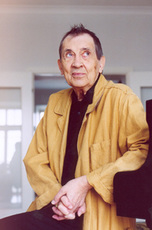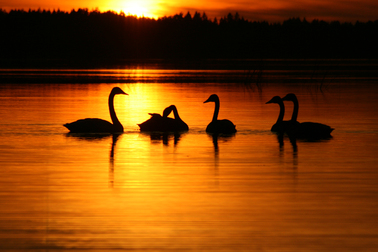| Today at ten to eleven I saw sixteen swans. One of my greatest experiences! Lord God, what beauty! They circled over me for a long time. Disappeared into the solar haze like a gleaming silver ribbon. Their call the same woodwind type as that of cranes, but without tremolo… Words written almost exactly a hundred years ago, by a composer whose 150th anniversary we celebrate this year. We can be sure, from this diary entry, of three things: of the three species of swans in Europe, Sibelius had seen the whooper swan, whose call he describes perfectly; that they were arriving from their migration, possibly from Britain, since the date, 21 April, is exactly right; and that Sibelius paid close, detailed attention to the sounds of nature. |
Sibelius had found the inspiration for what was to become one of the most celebrated features of his most popular symphony: the so-called swan theme. It appears in the third and final movement, and is hinted at elsewhere. This movement begins with a rapid melody in the strings, followed by a swaying, triple-time motif in the horns, the swan-theme, inspired by the sound of their calls, and the sight of those sixteen whoopers.
Sibelius’s love of nature is well documented. The Finnish landscape often served as material for his music. His biographer, Erik Tawaststjerna, noted that "Even by Nordic standards, Sibelius responded with exceptional intensity to the moods of nature and the changes in the seasons: he scanned the skies with his binoculars for the geese flying over the lake ice, listened to the screech of the cranes, and heard the cries of the curlew echo over the marshy grounds just below Ainola. He savoured the spring blossoms every bit as much as he did autumnal scents and colours”

There seems to be something of the naturalist in how Rautavaara views his own music. In a 1997 interview he said:
“I like different points of view, different aspects on the same work. For instance, Cantus Arcticus, the Concerto for Birds and Orchestra has been recorded many, many times, and the recording in Ondine by Pommer is very, very good indeed. I like it very much. But there is also a recording by BIS, the Swedish company, where the birds really are a soloist of the concerto. They are much more in foreground, so it sounds really different, entirely different in the basic attitude to the music. And that I love very much, too!"

 RSS Feed
RSS Feed
